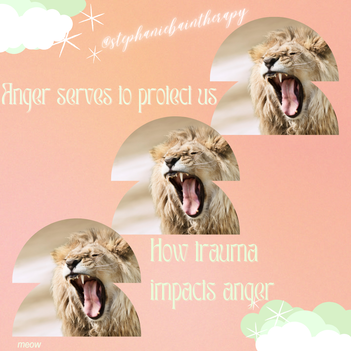|
Individuals who've experienced complex trauma and/or emotionally dysregulated caretakers may experience heightened anger or have a hard time experiencing and interacting with anger at all. Anger is a sign of boundary crossing and of threat. When an individual has suffered trauma this emotional reaction is turned up--leading to disproportionate or overwhelming anger or leading to fear, anxiety, and emotional shutdown shut-down. This may look and feel like an overreaction. A compassionate, trauma-informed reframe is... there's no such thing as an overreaction, we just may not be reacting to what's in front of us. As a trauma therapist in Oakland, CA, I often work with clients to:
There are two common ways trauma can impact experiences of anger: 1. 𝕙𝕪𝕡𝕖𝕣𝕧𝕚𝕘𝕚𝕝𝕒𝕟𝕥 𝕒𝕟𝕘𝕖𝕣 Individuals react to certain circumstances with disproportionate anger. Individuals become overwhelmed with feelings of anger. When this is your experience, you may notice intense bodily reactions--feelings of needing to leave and or like you are coming out of your skin. When this is your experience you need to know the signs of when of when you are starting to feel overwhelmed and take a break from conflict or whatever is triggering you to use nervous regulation tools. Partners should strategize ahead of time on how to support each other when breaks are needed. 2. 𝕕𝕚𝕤𝕠𝕨𝕟𝕖𝕕 𝕒𝕟𝕘𝕖𝕣 Anger is perceived as scary and not permissible. Anger comes out as passive aggressiveness or resentment. Or, anger provokes a shut-down response. This reaction can be very frustrating and confusing to others who feel their loved one is pushing them away or being mean with unclear comments. Of course, if you experience disowned anger, this also leads to frustration and shame and a difficulty getting your own needs met. When this is the case, it is crucial to get support on understanding why anger feels uncomfortable to express, learning to identify anger, beginning to feel safe expressing anger, and learning ways to communicate anger in healthy ways. Looking from a trauma therapist in Oakland, CA? Learn more here. Looking for a queer couples therapist in Oakland, CA? Learn more here. Trauma impacts how you experience anger
0 Comments
Leave a Reply. |
AuthorStephanie Bain, LMFT Archives
April 2024
Categories
All
***Resources are not a substitute for therapy and are not intended for making diagnoses or providing treatment. Not all practices and tools are suitable for every person. Please discuss exercises, practices, and tools with your individual therapist or health care provider.
|







 RSS Feed
RSS Feed